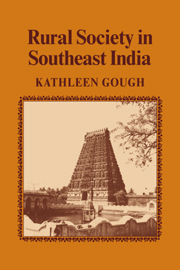Book contents
21 - Village Politics: The Caste Hindūs
from Part III - Kirippūr
Published online by Cambridge University Press: 29 October 2009
Summary
The Settlement of Disputes
In 1952 the Brahmans and Non-Brahmans of Kirippūr had had no street headman for the past thirty years. Although I am unsure why, I believe that labor migration, the arrival of newcomers, economic disparities within each street, and the fact that many people earned money outside the village produced disunity. On Lower Street, two Sengunda Mudaliars did collect money for the Draupadi Amman temple, managed its two-thirds acre of land, and leased out fishing in the Ayyaṉar temple tank to Nādārs once a year to obtain more cash for the two Lower Street temples' expenses. They had, however, no authority to settle disputes or witness marriages.
The Toṇḍaimaṇḍalam Mudaliar street also had no regular group of elders to manage its affairs or to govern the lower castes, probably because its members lacked the power of landownership over the village at large. The two wealthiest men in the village – the Padaiyacchi rich peasant owning twenty acres and the Naidu soda factory owner – were too newly rich, uneducated, low in caste, and unassuming in personality to command much authority in the village or even in their streets.
The village headman did have the legal right to settle civil disputes involving not more than Rs. 50, and the obligation to call the police in case of crime. Coming from an old, high-caste family and owning fifteen acres of land in addition to being headman, he was also often called on by disputants to settle general kinds of “trouble” such as theft, adultery, or assault among Non-Brahmans of lower caste.
- Type
- Chapter
- Information
- Rural Society in Southeast India , pp. 389 - 395Publisher: Cambridge University PressPrint publication year: 1982



